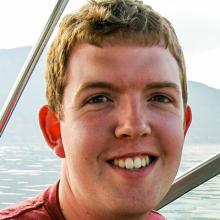Jake Lever
Why did you decide to pursue a graduate degree?
I have always enjoyed learning, and this degree offered a great application of my undergraduate in computer science with wonderful scope to learn new topics. I had worked in industry for a few years after my undergraduate and found that the most interesting aspects involved independent research. Plus the opportunity to do rewarding research in the medical domain was too great an opportunity to turn down.
Why did you decide to study at UBC?
Having travelled quite a bit, I knew I wanted to pursue a graduate degree outside my native Britain. I had visited Vancouver previously for only a couple of days and already knew it was a beautiful city. Everyone I talked to, told me what a wonderful place it is. And when I found out about the world-leading cancer research taking place at the BC Cancer Agency, I knew UBC would be a great fit.
What is it specifically, that your program offers, that attracted you?
During the first year of the program, I was able to do rotations and work in three different labs. As I didn’t have much knowledge on the current state of bioinformatics research, this gave me an excellent taste of various research projects, from drug design for prostate cancer to testing associations between ancient retroviruses and cancer. The program also offers a great scope to choose the courses which really mattered to me and my research.
What was the best surprise about UBC or life in Vancouver?
I knew that Vancouver was a beautiful city but I hadn't realised how many amazing beaches there are. My first night at UBC I went down to the beach with new friends from St John's College and played frisbee. It just wasn't what I was expecting in Canada. Plus I was also surprised by the scale and beauty of the UBC campus. The views of the ocean and mountains are just fantastic.
What aspect of your graduate program do you enjoy the most or are looking forward to with the greatest curiosity?
Bioinformatics attracts a wonderful variety of researchers from a very diverse set of backgrounds. There are biologists, mathematicians, programmers, clinicians and more. This brings a wonderful mixture of knowledge together and creates some really fun discussions.
What do you see as your biggest challenge(s) in your future career?
This field is moving very quickly, and technologies have changed dramatically even in only the last five years. The biggest challenge in this field is to keep abreast of the various techniques and understanding the best ways to use them.
How do you feel your program is preparing you for those challenges?
The wonderful variety of highly experienced researchers at the BC Cancer Agency freely share their amazing knowledge of the field through regular lectures, and also lead the field in many of the research topics that I’m involved in. This has made it much easier to learn about the wide selection of research in the field.
What aspects of your life or career before now have best prepared you for your UBC graduate program?
I’m very glad that I worked in industry before returning to graduate school. The goal-driven work taught me a lot of skills, like time management and team-work, that I’ve found invaluable in conducting my research.
What do you like to do for fun or relaxation?
During winter I greatly enjoy heading to the mountains for snowboarding, which I started learning when I first moved to Vancouver. I’ve also begun learning salsa dancing so that I can go to the great Robson Square Sunday Salsa events during the summer. And I try to read non-scientific literature in my few spare moments.
What advice do you have for new graduate students?
Students are in the unique place to try out new fields, learn new skills and meet an amazing selection of people. I'd recommend getting as involved with the university or greater Vancouver community, whether in a graduate community like St John's College or signing up as a volunteer for many of the university's great initiatives.

